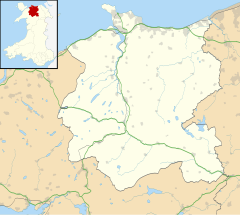Llannefydd
| Llannefydd | |
|---|---|
 Llannefydd |
|
| Llannefydd shown within Conwy | |
| Population | 590 (2011) |
| OS grid reference | SH981706 |
| Community |
|
| Principal area | |
| Ceremonial county | |
| Country | Wales |
| Sovereign state | United Kingdom |
| Post town | DENBIGH |
| Postcode district | LL16 |
| Dialling code | 01745 |
| Police | North Wales |
| Fire | North Wales |
| Ambulance | Welsh |
| EU Parliament | Wales |
| UK Parliament | |
| Welsh Assembly | |
Llannefydd is a village and community in Conwy County Borough, in Wales. It is located on the border with Denbighshire, between the Afon Aled and River Elwy, 5.7 miles (9.2 km) north west of Denbigh, 5.8 miles (9.3 km) south west of St Asaph, 6.9 miles (11.1 km) south of Abergele and 15.2 miles (24.5 km) south east of Conwy. In the 2011 census the community parish had a population of 590.
Saint Nefydd and Saint Mary's church, founded in the fifth century, is Grade I listed; the farms of Berain and Plas Uchaf are Grade II* listed, while numerous agricultural buildings in the community, along with a number of bridges over the two rivers, are Grade II listed. In 1978, archaeological excavations in a cave at Bont-newydd, in the east of the community, unearthed the teeth and jawbone of an 11-year-old Neanderthal boy dating from 230,000 years ago, the oldest human remains discovered in Wales.
Thomas Edwards, better known as the Welsh language dramatist and poet Twm o'r Nant, was born in Llannefydd in 1738, but fled to Llandeilo to avoid imprisonment for his uncle's debts, for which he had stood surety. His anterliwtau (English: interludes), satirical musical plays, lambasted tax collectors, landlords, lawyers and the religious hypocrisy of the established church, and promoted Methodism.
...
Wikipedia

